#cognitive impairment causes
Text
Know about Mild Cognitive Impairment Causes - Visit at Prodrome!
Mild cognitive impairment causes is a condition in which a person experiences a slight - but noticeable - decline in mental abilities (memory and thinking skills) compared to others of the same age. The slight decrease in abilities is evident in the person experiencing them or in others interacting with the person, but the changes are not severe enough to interfere with normal daily life and activities. For more info visit us at Prodrome!
0 notes
Text
hm
I've seen a LOT of shaming going round at the moment, both here and on twitter, of people who are seeking out good omens spoilers, mostly by those who have watched the new episodes in advance. despite what neil and david and michael may have said on the subject, it's rubbing me the wrong way! so I feel the need to make a potentially unpopular post about
✨SPOILERS AND NEURODIVERSITY✨
(and accessibility) 🤚🏼
now I cannot speak for everybody here but as an autistic person with ocd I actually !prefer! being spoiled ahead of time and will frequently read the entire wiki article for a show I'm about to watch (though weirdly CANNOT skip ahead with books?) in order to alleviate anxiety around the unexpected. trust me when I say that knowing what will happen in advance *enhances* the experience for me and I have yet to regret being deliberately spoiled, even when it comes to my absolute favourite things on earth, things I may have been waiting months and months (or in this case years) for.
in fact, the longer I've had to wait, the more the feeling of gut-twisting anxiety and uncertainty beds down in my system and makes itself a very unwelcome house guest.
it's all very well insisting that everybody just be patient and ~wait and see~ but for a lot of neurodiverse folks this can be a very unsettling prospect. personally, I don't like surprises! I don't crave the sensation of being shocked by an unforeseen twist! it makes me do a panic! even the thought of it makes me feel deeply uncomfortable.
we're not simply throwing our toys out the pram because we WANT something and we WANT IT NOW (shout out to verruca salt). there is a soothing comfort and stability to predictability that is difficult to explain to somebody who doesn't experience this.
at this point I should mention that OBVIOUSLY not all neurodiverse/autistic/diagnosed-ocd people feel this way but that doesn't negate the fact that a lot of us do and there's not much we can do about it.
I'm aware that everybody's currently moralising about the rightness/wrongness of illicitly distributing and trading nuggets of forbidden information like crack-laced pokemon cards* (surely in this fandom everything should exist in a grey area?) but please don't jump on this as an opportunity to prove who's the most terribly righteous and which of us gets to wear the Super Duper Bestest Fan Neil's Favourite prefect badge for the day. devolving into needless factions and one-upmanship so near to the official airdate does nobody any good.
on another personal note (this is the 👂🏼♿accessibility♿👂🏼bit) I was due to attend one of the screenings and now can't due to the apparent lack of subtitles. pleeeeeaase think of accessibility, amazon. please? some of us have severely messed up ears and/or auditory processing disorders - it's not hurting anybody to have the words up on the screen but it excludes many of us if you don't.
again, if you think it's terrible and wrong to want to be spoiled or to share spoilers you are well within your rights to think that, and of course I encourage anybody who is participating in a bit of blackmarket spoiler dealing to utilise ALL the tags you can think of to keep it secret (keep it safe), or simply leave it to the DMs, but I really don't see the good in shaming others who feel differently.
uhh thank you and good day 🎩
(*hopefully that still scans - my references are as ancient and ephemeral as my knee cartilage)
#good omens#gos2 spoilers#go2 spoilers#good omens 2#gos2#good omens season 2#good omens season 2 spoilers#personal#neurodiversity#ocd#did i put enough tags on this one?#i also have adhd and ptsd btw lmao#and an autoimmune disease which causes cognitive impairment#got allllll the high quality genes up in this bad boy [slaps thigh which immediately dislocates]
193 notes
·
View notes
Text
it's time to play everyone's favorite game: is this a migraine, sleep deprivation, caffeine withdrawal, low electrolytes, low blood sugar, dissociation, something else, some combination of the above, or did i bump my head real good this time?
#txt#inb4 ''those dont even feel like a concussion though?'':#in my fucked up body they can cause confusion and cognitive impairment‚ which (alongside a migraine) feels VERY concussiony#weed mention ahoy#anyway. im gonna eat + take an edible + lay in the dark for 18 hours. then i'll reassess.#weed does make it harder to tell whether im experiencing cognitive symptoms‚ BUT it makes it possible for me to. yknow.#lie in the dark for 18 hours.
2 notes
·
View notes
Text
sometimes i miss my old blog but then i remember being accused of being a dirk strider kinnie
#villain origin story#there should be research on the cognitive impairments in teenagehood caused by being a jade harley blog accused of kinning dirk strider#im joking#i just think its kinda funny#homestuck#mar speaks
2 notes
·
View notes
Note
o great and powerful sensei latlat, plz give me advice on how to beat up my bully neighbor >:( he has accused me of stealing his lawnmower and is gonna kick my ass for this made up crime ;A;

S... Sen...
Se... Sensei LatLat? Huh?!
Okay, um, please try to talk it out. Of all the things to fight someone over, landscaping seems like a really stupid reason to make things go bad...
If you really have to fight, though, the key is to know yourself? Know your skills and work with them. If you are strong and big, brute force is best. Endurance means focus on outlasting an opponent, being nimble means dodging more...
And I'm not any of those things, so I have to be smart. Having a solid understanding of anatomy and rupturing a vital organ is a surefire way to end a fight fast. Being small makes it easier to hit torso targets. But that's extreme, so again, try to talk it out. Maybe help him search for this lawnmower.
And if all else fails, get friends or family to help. Your neighbor might want to call you a coward for putting your trust in others, but he will not be able to call you anything if his teeth are kicked in by your trustworthy buddy.
Again, I cannot stress this enough, PLEASE DO NOT RESORT TO PHYSICAL VIOLENCE OVER A TOOL. This is reference for self-defense if this bully insists on escalating it into something truly dangerous or in other more dire situations. Maybe try conflict resolution therapy or something? Did you try pinning the blame on someone else? Or inviting him over for tea and calmly explaining the misunderstanding? Bake him a bread! Homemade bread is the most good-faith food there is!
Ooh, wait! Also, learn to improvise. Having a weapon with you all the time is extreme, but training yourself to look around you and thinking how you could defend yourself with mundane things is a good habit to get into. I've even used things like flowers and credit cards. Credit cards are actually quite effective when you file one edge into a blade beforehand. I always have a sharpened one on me just in case.
Ak, I keep talking, but I should have left it at don't fight over lawn care equipment. If you want to fight, get a real problem. Wait, no, don't - I don't mean - Don't fight! Just - Just forget this conversation happened, alright?! Do not fight him!
#ic#this is so old but I've been thinking about it every day for two weeks anon. And now it is ready.#i had way too much fun with this#yes he is soft and sweet but dude has SURVIVED he KNOWS HOW TO THROW TF DOWN IF NEEDED.#particularly by stabbing in the gallbladder to burn the abdominal cavity with bile.#Remember: If you can easily hit their carotid artery real hard then you can cause temporary cognitive impairment that'll delay reaction tim#...or hemorrhagic stroke but let's ignore that risk
2 notes
·
View notes
Text
Poison list
While it's important to approach writing with creativity and imagination, it's crucial to prioritize responsible and ethical storytelling. That being said, if you're looking for information on poisons for the purpose of writing fiction, it's essential to handle the subject matter with care and accuracy. Here is a list of some common poisons that you can use in your stories:
Hemlock: Hemlock is a highly poisonous plant that has been used as a poison in various works of literature. It can cause paralysis and respiratory failure.
Arsenic: Arsenic is a toxic element that has been historically used as a poison. It can be lethal in high doses and can cause symptoms such as vomiting, abdominal pain, and organ failure.
Cyanide: Cyanide is a fast-acting poison that affects the body's ability to use oxygen. It can cause rapid loss of consciousness and cardiac arrest.
Nightshade: Nightshade plants, such as Belladonna or Deadly Nightshade, contain toxic compounds that can cause hallucinations, respiratory distress, blurred vision, dizziness, an increased heart rate, and even death when ingested.
Ricin: Ricin is a potent poison derived from the castor bean plant. It can cause organ failure and has been used as a plot device in various fictional works.
Strychnine: Strychnine is a highly toxic alkaloid that affects the nervous system, leading to muscle spasms, convulsions, and respiratory failure.
Snake Venom: Various snake venoms can be used in fiction as deadly poisons. Different snake species have different types of venom, each with its own effects on the body.
Digitalis: Digitalis, derived from the foxglove plant, contains cardiac glycosides. It has been historically used to treat heart conditions, but in high doses, it can be toxic. Overdosing on digitalis can cause irregular heart rhythms, nausea, vomiting, and visual disturbances.
Lead: Lead poisoning, often resulting from the ingestion or inhalation of lead-based substances, has been a concern throughout history. Lead is a heavy metal that can affect the nervous system, leading to symptoms such as abdominal pain, cognitive impairment, anemia, and developmental issues, particularly in children.
Mercury: Mercury is a toxic heavy metal that has been used in various forms throughout history. Ingesting or inhaling mercury vapors can lead to mercury poisoning, causing symptoms like neurological impairment, kidney damage, respiratory issues, and gastrointestinal problems.
Aconite: Also known as Wolfsbane or Monkshood, aconite is a highly toxic plant. Its roots and leaves contain aconitine alkaloids, which can affect the heart and nervous system. Ingesting aconite can lead to symptoms like numbness, tingling, paralysis, cardiac arrhythmias, and respiratory failure.
Thallium: Thallium is a toxic heavy metal that can cause severe poisoning. It has been used as a poison due to its tastelessness and ability to mimic other substances. Thallium poisoning can lead to symptoms like hair loss, neurological issues, gastrointestinal disturbances, and damage to the kidneys and liver.
When incorporating poisons into your writing, it is essential to research and accurately portray the effects and symptoms associated with them. Additionally, be mindful of the potential impact your writing may have on readers and the importance of providing appropriate context and warnings if necessary.
If you want to read more posts about writing, please click here and give me a follow!

#creative writing#writing#writeblr#writerscommunity#writer things#writers#writersociety#on writing#writers on tumblr#writblr#writings#writer#words#write#writers and poets#writing stuff#writing tools#writing prompt#writing community#writing inspiration#writing tips#writing advice#poison type#literature#belladonna
22K notes
·
View notes
Text
Where to Start Your Research When Writing a Disabled Character
[large text: Where to Start Your Research When Writing a Disabled Character]
So you have decided that you want to make a disabled character! Awesome. But what's next? What information should you decide on at the early phrase of making the character?
This post will only talk about the disability part of the character creation process. Obviously, a disabled character needs a personality, interests, and backstory as every other one. But by including their disability early in the process, you can actually get it to have a deeper effect on the character - disability shouldn't be their whole life, but it should impact it. That's what disabilities do.
If you don't know what disability you would want to give them in the first place;
[large text: If you don't know what disability you would want to give them in the first place;]
Start broad. Is it sensory, mobility related, cognitive, developmental, autoimmune, neurodegenerative; maybe multiple of these, or maybe something else completely? Pick one and see what disabilities it encompasses; see if anything works for your character. Or...
If you have a specific symptom or aid in mind, see what could cause them. Don't assume or guess; not every wheelchair user is vaguely paralyzed below the waist with no other symptoms, not everyone with extensive scarring got it via physical trauma. Or...
Consider which disabilities are common in real life. Cerebral palsy, muscular dystrophy, stroke, cataracts, diabetes, intellectual disability, neuropathy, multiple sclerosis, epilepsy, thyroid disorders, autism, dwarfism, arthritis, cancers, brain damage, just to name a few.
Decide what specific type of condition they will have. If you're thinking about them having albinism, will it be ocular, oculocutaneous, or one of the rare syndrome-types? If you want to give them spinal muscular atrophy, which of the many possible onsets will they have? If they have Ehlers-Danlos Syndrome, which one out of the 13 different types do they have? Is their amputation below, or above the knee (it's a major difference)? Not all conditions will have subtypes, but it's worth looking into to not be surprised later. This will help you with further research.
If you're really struggling with figuring out what exact disability would make sense for your character, you can send an ask. Just make sure that you have tried the above and put actual specifics in your ask to give us something to work with. You can also check out our "disabled character ideas" tag.
Here are some ideas for a character using crutches.
Here are some ideas for a character with a facial difference (obligatory link: what is a facial difference?).
If you already know what disability your character is going to have;
[large text: If you already know what disability your character is going to have;]
Start by reading about the onset and cause of the condition. It could be acquired, congenital, progressive, potentially multiple of these. They could be caused by an illness, trauma, or something else entirely. Is your character a congenital amputee, or is it acquired? If acquired - how recently? Has it been a week, or 10 years? What caused them to become disabled - did they have meningitis, or was it an accident? Again, check what your options are - there are going to be more diverse than you expect.
Read about the symptoms. Do not assume or guess what they are. You will almost definitely discover something new. Example: a lot of people making a character with albinism don't realize that it has other symptoms than just lack of melanin, like nystagmus, visual impairment, and photophobia. Decide what your character experiences, to what degree, how frequently, and what do they do (or don't do) to deal with it.
Don't give your character only the most "acceptable" symptoms of their disability and ignore everything else. Example: many writers will omit the topic of incontinence in their para- and tetraplegic characters, even though it's extremely common. Don't shy away from aspects of disability that aren't romanticized.
Don't just... make them abled "because magic". If they're Deaf, don't give them some ability that will make them into an essentially hearing person. Don't give your blind character some "cheat" so that they can see, give them a cane. Don't give an amputee prosthetics that work better than meat limbs. To have a disabled character you need to have a character that's actually disabled. There's no way around it.
Think about complications your character could experience within the story. If your character wears their prosthetic a lot, they might start to experience skin breakdown or pain. Someone who uses a wheelchair a lot has a risk of pressure sores. Glowing and Flickering Fantasy Item might cause problems for someone photophobic or photosensitive. What do they do when that happens, or how do they prevent that from happening?
Look out for comorbidities. It's rare for disabled people to only have one medical condition and nothing else. Disabilities like to show up in pairs. Or dozens.
If relevant, consider mobility aids, assistive devices, and disability aids. Wheelchairs, canes, rollators, braces, AAC, walkers, nasal cannulas, crutches, white canes, feeding tubes, braillers, ostomy bags, insulin pumps, service dogs, trach tubes, hearing aids, orthoses, splints... the list is basically endless, and there's a lot of everyday things that might count as a disability aid as well - even just a hat could be one for someone whose disability requires them to stay out of the sun. Make sure that it's actually based on symptoms, not just your assumptions - most blind people don't wear sunglasses, not all people with SCI use a wheelchair, upper limb prosthetics aren't nearly as useful as you think. Decide which ones your character could have, how often they would use them, and if they switch between different aids.
Basically all of the above aids will have subtypes or variants. There is a lot of options. Does your character use an active manual wheelchair, a powerchair, or a generic hospital wheelchair? Are they using high-, or low-tech AAC? What would be available to them? Does it change over the course of their story, or their life in general?
If relevant, think about what treatment your character might receive. Do they need medication? Physical therapy? Occupational therapy? Orientation and mobility training? Speech therapy? Do they have access to it, and why or why not?
What is your character's support system? Do they have a carer; if yes, then what do they help your character with and what kind of relationship do they have? Is your character happy about it or not at all?
How did their life change after becoming disabled? If your character goes from being an extreme athlete to suddenly being a full-time wheelchair user, it will have an effect - are they going to stop doing sports at all, are they going to just do extreme wheelchair sports now, or are they going to try out wheelchair table tennis instead? Do they know and respect their new limitations? Did they have to get a different job or had to make their house accessible? Do they have support in this transition, or are they on their own - do they wish they had that support?
What about *other* characters? Your character isn't going to be the only disabled person in existence. Do they know other disabled people? Do they have a community? If your character manages their disability with something that's only available to them, what about all the other people with the same disability?
What is the society that your character lives in like? Is the architecture accessible? How do they treat disabled people? Are abled characters knowledgeable about disabilities? How many people speak the local sign language(s)? Are accessible bathrooms common, or does your character have to go home every few hours? Is there access to prosthetists and ocularists, or what do they do when their prosthetic leg or eye requires the routine check-up?
Know the tropes. If a burn survivor character is an evil mask-wearer, if a powerchair user is a constantly rude and ungrateful to everyone villain, if an amputee is a genius mechanic who fixes their own prosthetics, you have A Trope. Not all tropes are made equal; some are actively harmful to real people, while others are just annoying or boring by the nature of having been done to death. During the character creation process, research what tropes might apply and just try to trace your logic. Does your blind character see the future because it's a common superpower in their world, or are you doing the ancient "Blind Seer" trope?
Remember, that not all of the above questions will come up in your writing, but to know which ones won't you need to know the answers to them first. Even if you don't decide to explicitly name your character's condition, you will be aware of what they might function like. You will be able to add more depth to your character if you decide that they have T6 spina bifida, rather than if you made them into an ambiguous wheelchair user with ambiguous symptoms and ambiguous needs. Embrace research as part of your process and your characters will be better representation, sure, but they will also make more sense and seem more like actual people; same with the world that they are a part of.
This post exists to help you establish the basics of your character's disability so that you can do research on your own and answer some of the most common ("what are symptoms of x?") questions by yourself. If you have these things already established, it will also be easier for us to answer any possible questions you might have - e.g. "what would a character with complete high-level paraplegia do in a world where the modern kind of wheelchair has not been invented yet?" is much more concise than just "how do I write a character with paralysis?" - I think it's more helpful for askers as well; a vague answer won't be much help, I think.
I hope that this post is helpful!
Mod Sasza
#mod sasza#writing reference#writing advice#writing resources#writeblr#writing disabled characters#writing resource#long post#writing tips#writing guide
3K notes
·
View notes
Text
I was looking into head trauma caused by bullet wounds to get a more realistic outlook on how the courier six would be off and they’d probably be at higher risk of having epileptic seizures, some kind of cognitive function impairment, ptsd, frequent headaches, and probably more that I missed. So yeah, shoot that son of bitch Benny as a little treat
#basically it would fucking suck#and they’d deal with this for the rest of their life#if they even make it that long from recovery#fallout#fallout new vegas#fnv#courier six#fallout new vegas courier six
466 notes
·
View notes
Text
Dungeon Meshi is obviously primarily about food, eating, and crucially survival through eating, but it's also focused on other aspects of survival. Sleep, rest, social ties and social exclusion. There's even extensive commentary on things like personal grooming (Marcille’s hair, Toshiro becoming depressed and no longer shaving), clean bathrooms, and other things. When it comes to disability these things are referred to as instrumental activities of daily life (IADLs), which are more complex things like shopping, housework, and cooking, which people need to do to survive, and activities of daily life (ADLs) which are the basic bare bones needs: eating, toileting, etc. Dungeon Meshi is concerned with the logistics of living and finding joy in those logistics.
This is super related to disability! Yes, Laios is autistic, this has been apparent from the beginning. But what does being autistic mean for him and the story? Mostly, it means his desires, goals, and the ways he goes about achieving them are strange, foreign, or baffling. He has different priorities than other people and the way he expresses those priorities are strange. They affect how he socializes, how he eats…
So, it absolutely makes sense that there would be a minor sideplot about activities of daily living and what it's like to be out of sync with everyone else when it comes to prioritizing things. It's Mithrun Time (he's gonna mith all over the place) and I'm so SO interested in the interplay of disability, caregiving and the logistics thereof, and intersectionality & privilege. Who needs care? How do other people feel about them needing care? How do they receive that care? And who do we think is worthy of receiving care and how does that interact with all these other factors?
Bunch of manga and extras spoilers past the cut:
“So, what's wrong with you?”
I see a lot of people talking about Mithrun's non-eye disability as a depression allegory, which I think is true, but I think it's also metaphorically/symbolically both a traumatic brain injury and a trauma response to sexual assault. The sexual assault aspect is pretty clear if you look at any of the symbolism of the actual disabling event: just look at it.
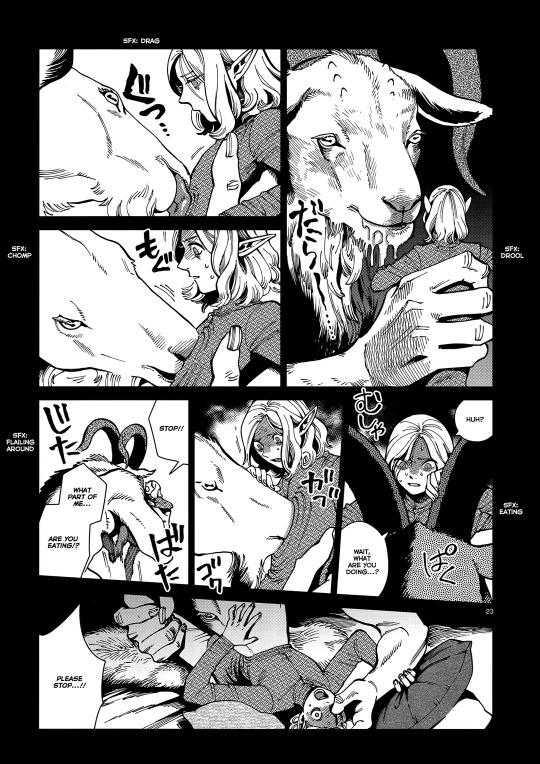
Mithrun is lying in bed and the goat comes to him, lifts him up and puts its mouth on his abdomen and lower pelvis. The eating is sexually charged, as is the particular way he struggles and protests. It's intensely violating, and things that were once desirable are lost. And the dungeon lord group therapy session involves a lot of people talking about the demons like an abusive lover; Mithrun, even though he wanted to kill the demon so badly, still says that they're gentle.
As for the brain injury, chronic TBIs can cause a wide variety of symptoms. Some immediately relevant ones are anhedonia (lack of enjoyment), executive function issues, poor interoception (trouble understanding what's going on in your body), cognitive impairment affecting ability to reason/multitask/plan/solve problems, changes in behavior and personality, depression, agitation, and restlessness. We see… basically all of these, in Mithrun, as downstream effects of the loss of desires. He can't tell when he's hungry, tired, or out of mana; he can't perform ADLs consistently even if he knows he'll die without doing them and dying without doing them will interfere with his long-term goal, he had drastic personality changes, he oscillates between impatient and totally withdrawn.
Brain injuries can also affect more complex tasks and ability to sustain lengthy periods of complex cognitive work. A common example is losing the ability to read and process longer passages; maybe you can read the words but you can't read a paragraph, or maybe you can read paragraphs but now you get a migraine after 15 minutes. Mithrun's skill loss is not related to reading but the effect is similar – he is and was extremely skilled in a particular area of magic, but also disabled in ways that specifically hinder his skill in this area – to teleport things properly you need depth perception and a sense of direction, and he lacks both of these! And while he's still an incredibly effective fighter it seems like he pretty frequently makes those sorts of mistakes.
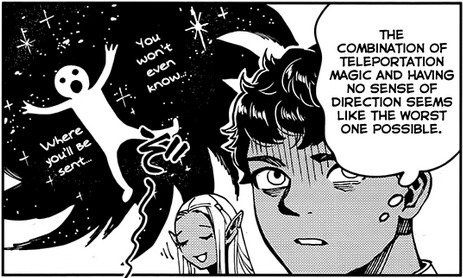
This is treated often as a gag and it is genuinely funny but it’s also very real, to no longer be as good at the thing you were good at before you became disabled. Kui takes several throwaway gags seriously later on, not just this one. Another ~gag that's not really elaborated on is the bathroom thing, but I appreciate its inclusion anyway, since even if it's presented humorously it doesn't feel meanspirited in a way a lot of “diaper jokes” do. I think people need to talk a lot more about bathroom issues in a wide variety of disabilities, and I think it's nice that a guy I can already picture the “poor little meow meow” posts about also has this issue, you know?
Preferences vs Desire
Even referencing PTSD and TBIs it's hard to really grasp what having no desires means, and the characters don't generally ask, while Mithrun explains it in vague terms. “Desires” is a very broad term and indeed he has lost access to a wide but related variety of things. Unfortunately this lead to him often being treated as nonagentic.
Mithrun does still have preferences, even if he doesn't express them and has no desire which would drive him to seek out pleasant things and avoid unpleasant ones. He'll comment on the taste and texture of foods, for example – sure seems like he has an opinion!
People treat it like his preferences don't matter since he doesn't usually bring them up unprompted, and he's often in situations where there aren't other options.
Kabru seems best at not doing this (and, noncoincidentally, also seems to be the best at actually caring for him; the Canaries have a lot more Resources theoretically than Kabru And Mithrun Eating Monsters And Kabru's A Bad Cook, but although they are loudly distressed by the two of them disappearing it seems to have positively affected Mithrun's general health)
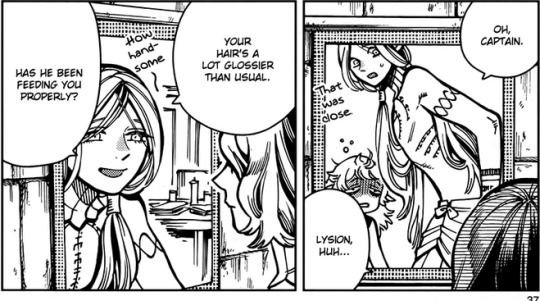
But, uh, acknowledgement that someone has preferences at all is a really low bar to clear and Kabru also doesn't seem to fully understand how Mithrun's brain works. Mithrun’s caregivers want him to eat when they want him to eat. They want him to rest and drink when they want him to.
He lacks the desire for a number of mundane things but also seems to lack the ability to tell when he needs them. He can't explain why he faints; is “I am out of mana” considered a desire for more mana, one that can be eaten? He can't sleep on his own; it's not only that he lacks “the desire to go to bed” but he can't do anything with his own exhaustion, even if he notices it. He comments on the unpleasant taste and texture of several meals; he may be unable to want to not eat it, but he definitely can tell when he dislikes something. But he also seems to be unable to tell when he's hungry.
Kabru will acknowledge these preferences but there's not really other food options, and Everyone Must Eat. Kabru doesn't know the details of Mithrun's condition yet but you can see the immediate frustration here and the way he offers food to him like Mithrun's a child.
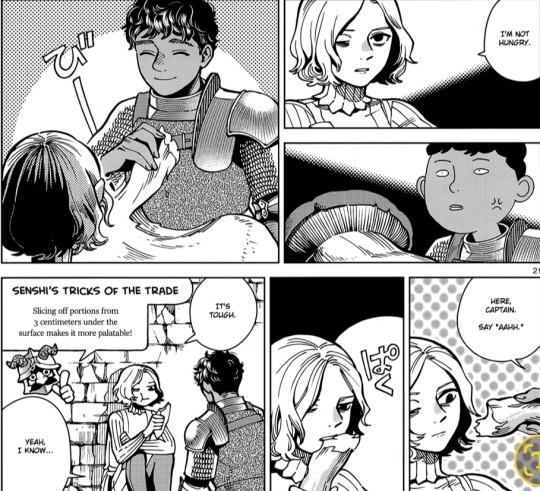
Sure, he won't directly communicate preferences, so that makes it extra hard, but you can always just ask, and if he tells you he tells you.
The pathway between opinion and taking actions about it may be lost in Mithrun but the dungeon forces other people into a similar position – it forces them to eat food they don't want to eat so that they can survive or accomplish other goals. We've seen this with Marcille from the beginning. It's difficult with Mithrun because it seems like there is always going to have to be some sort of someone else overriding his autonomy – yeah, he's not hungry but he still needs to eat or he'll faint. Yeah, he's lying about whether or not he's clean but he still needs to wash or he'll die. Yeah, he needs to take a rest instead of keeping moving or he'll faint. But he's not unique in being in a situation where he has to do nonpreferred things. The difference is more that he lacks the ability to independently do anything when it comes to ADLs, preferred or not, which makes it into someone else’s choice and responsibility.
There's also a theme in Dungeon Meshi that comes up a bit of people being pushy about ADLs but from a slightly different perspective, and they're usually right. You see this in Senshi most commonly; he pushes the residents of the Golden City to actually eat even if they don't need to and can't taste it, and while he's correct in that Yaad does get enjoyment from the food even without taste he's still not quite listening to Yaad. Similarly, Kabru is correct in that he can get Mithrun to sleep without a sleeping spell, but he also ignores the way Mithrun says several times that he doesn't expect massage to work. There's a few aspects to this – wild but expected that the elves would choose the “just knock him out with a spell” route, the “easy way” Senshi always talks about when it comes to magic, instead of actually paying attention to other solutions. But also, generally, people know their bodies best, and sometimes even if you're really sure you have the trick to help them you have to listen to what they tell you.
tvtropes dot org frontslash DisabilityTropes
This is going to be a harder section just because it's so subjective; it's nearly impossible to think about the ways in which disabled people are viewed by the people around them/wider society with any degree of objectivity just because there are so many factors that go into it. But I do think Mithrun is consistently treated as relatively nonagentic and there are several ways this can manifest: being treated as a doll/pet/child, being treated as a weapon, and being a surface for people to project onto.
He's framed or treated as childlike intermittently through the manga; scattered about, just a little vibe in the way he's drawn, like the "say aah" above and Pattadol and Cithis through the teleportation scroll :
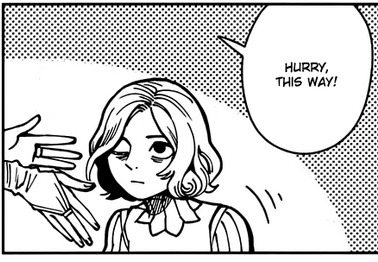
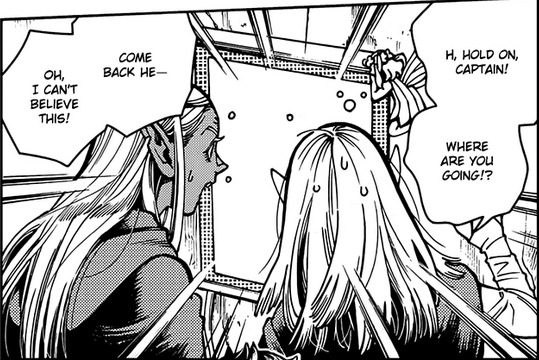
That's a middle aged man! And he's framed like a toddler getting picked up or misbehaving.
Which doesn't mean they care about him any less; his squad is really fond of him for someone who's technically like their parole officer. How dare you do this to our captain! They love him dearly; this is obvious and he comments on it! They respect him, too, as the leader and as a strong fighter. But loving someone and thinking they're a skilled fighter doesn't mean you respect their autonomy fully.
There's also an element of everyone projecting their own issues onto him; Kabru with their shared Dungeon Trauma. The canaries all suggesting wacky, midlife-crisis desires. He doesn't ever express that he minds any of this, except when they try to stop him from making particular decisions. They also don't often understand why he'd be motivated to do a particular thing, and in fact some of these projections may actually be correct! But while noodles and pottery may be good later-on goals for him, I think it's striking that a) Kabru was the closest to correctly guessing what desire Mithrun might acquire now and he was still guessing the exact opposite (suggesting a desire to not eat Falin but to help Laios, vs Mithrun's actual desire, which was to eat Falin with no thought given to the promise he made at all) and b) it's a desire that actually makes perfect sense with what we know about him, not something totally new.
And, finally, he's a weapon: people are willing to caretake him because he's good at killing things dead. If his only desire is to kill demons dead, it's easy to start seeing that as who he is. I don't think he'd argue that “trying to kill demons” takes up the majority of his life (it's his only goal and he's obsessed with it) but even if there's only one thing that matters to him he has autonomy (in the sense that he can make his own choices about what to prioritize and formulate his own plans) and personhood.
Politics and privilege – who gets to access care?
One of the things we're first presented with when it comes to Mithrun is that he is intensely capable at handling dungeons. Yeah, there's the immediately visible prosthetic eye and the navigation issues, but the Canaries are built up as being incredibly dangerous and skilled, and he's their captain; they all immediately defer to him. He's intense, he curbstomps an entire room of guards, he's efficient, he's brutal, he's strong physically and magically.
In short: yeah, he's very disabled. He's also still very useful.
At the risk of oversimplification, even within his particular disability, he's much more disabled than Marcille is (she lost something relatively simple and easy to miss, she has no catatonia-moment) but less disabled than Thistle, who seems to still have at least one desire related to the king but is still primarily catatonic. It seems like Thistle is not unusual among ex-dungeon lords, even if there's enough noncatatonic dungeon lords to form a support group later. When Milsiril finds Mithrun, she immediately intends to mercy-kill him – this seems to be a condition the elves are familiar with but consider terminal, at least to the degree Mithrun is affected, and people seem unfamiliar what it means to keep living in this state because Mithrun is unusual in that he survives at all. And he's “allowed” to survive initially because he's not as disabled as he could have been (still has a desire) and that desire is useful. They aim him at the dungeons and off he goes. It takes twenty years for him to recover enough to do it, sure, but they're elves. They can wait. He can still be useful.
Relatedly, when he loses the ability to pursue his desire he's immediately much worse off than he was previously.
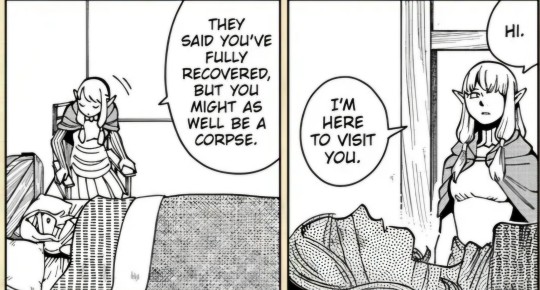
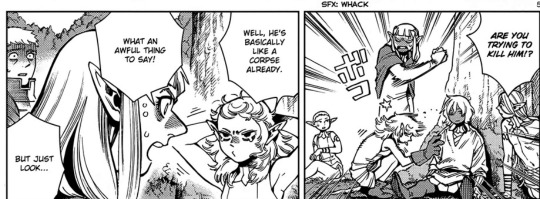
The no-desire catatonia is something that can recur and the elves continue to not know how to handle it. If Kabru wasn't there to problemsolve I think he'd have just… stayed there with his increasingly distressed squad.
Speaking of his squad, there's also a fascinating power dynamic going on with just the inherent structure of the Canaries; criminals are assigned as his caregivers. There's the inherent unfairness to the criminal Canaries about them being given extra duties, this strange rich noble guy who's now their Responsibility. There's so much possibility for resentment in normal caregiving relationships, much less being forced by your jailor into caregiving someone. But there's also an element of the power the prisoner Canaries now have over him and his most basic ADLs and needs. Assigning Cithis to his care is such a can of worms! The dynamics of the situation are frankly awful for both of them; of course she resents him initially. It would be strange for her not to. When Pattadol catches her making Mithrun do embarrassing things, she instantly reminds Cithis of her lower-status – she's forced to care for this nobleman and then forcibly reminded that she's beneath him.
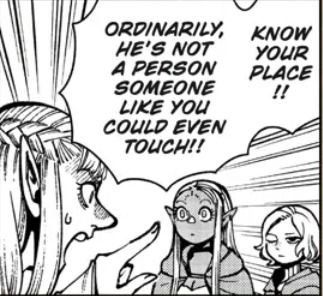
She's responding to having menial, low-status tasks forced on her by trying to humiliate him, and although he doesn't have the ability to care enough to stop her it's still a deliberate removal of dignity. He's the instrument with which she is punished and she punishes him in return (until it's not fun anymore and she understands him a bit more.)
Mithrun is a long-lived race, who has structural power over the shorter lived races simply because of how long they live. The dwarves and elves try to actively keep certain knowledge from other races, restricting their access to technology, and other expressions of distance. Senshi spends nearly the whole first season not listening to Chilchuck trying to explain that he's an adult and treating him like a child, and Kabru repeatedly says that the elves do the same thing (and tbh we see them doing it). There's even the fact that it took him twenty years to recover enough to join the Canaries again; a shorter-lived race might have died from old age in this time, or become too old to work in this capacity, and then wasted away without the drive to return to the dungeons. But they're elves; the other elves can afford to wait, and he's not going to age out of dungeoneering any time soon. Being an elf probably contributes to his wealth in the same way skin color contributes to wealth inequality in the real world.
Dungeon Meshi doesn't really go into race in the sense of skin color much, and Kui is writing from a different cultural standpoint than I am. While tallmen are quite accurate when it comes to skin/hair color (yes, even Kabru and his blue eyes; it's rare but possible) and cultural references, the elves, uh, absolutely are not, both in the sense of “dark skin & pale hair and eyes trope” and sense of the royals having jet black skin.
Still, I feel like race is so connected to care and caregiving in the real-world west that I would be profoundly remiss not to mention it. Skin color might not matter to elves in the racism sense, but it matters to humans and humans are the ones writing and analyzing this story. (And I fully expect as the fandom grows with anime-onlies people will like Mithrun more because he's white (has white features) than they would if he had darker skin, because fandom is also baseline racist.)
I don't think we can just not mention that Mithrun is pale-skinned and both Cithis and Kabru, his primary caregivers over the story, both have dark skin.
Racism means white people are more likely to get good medical care, the type you need to get diagnosed and prescribed caregiving. Racism means wealth distribution is uneven, favoring white people. Race affects immigrants taking on undesirable jobs like caregiving for low pay. Racism is a profound stressor which means it contributes to who becomes disabled in the first place in that it can worsen health outcomes.
Similarly to race, gender may not be very obvious when it comes to this subplot within the story but the gendered dynamics of caregiving in the real world are something I do want to touch on. There's an oft-cited statistic about how men are much more likely than women to divorce their partners when their partners are diagnosed with a serious condition; I don't like relying too much on those sorts of statistics because they can be so misleading but it does gesture at something very real, culturally. Even if men aren't supposed to be caretaken, women are supposed to be the caretakers. Certainly, it's not Mithrun's fault that he can't cook and can't do laundry and probably can't do most housework, but I do also think about all the posts passed around about “my boyfriend who won't do housework.”
Again, none of these privileges make him less disabled and less in need of and deserving of care, they're just worth talking about when we talk about caregiving in general.
It's Rotten Work, Even If It's You
People expect disabled people receiving care to be grateful, to accept anything, and to try and make it easier for the caregiver if they're able. Requiring care is an incredibly disadvantaged position, even as actually receiving it can be so tangled up in privilege. Caregiving is tremendously difficult work, it's true, but there's a particular vibe people want from disabled people – all those movies about not wanting to be seen as a burden. Never complaining. Being grateful.
And, uh, well…
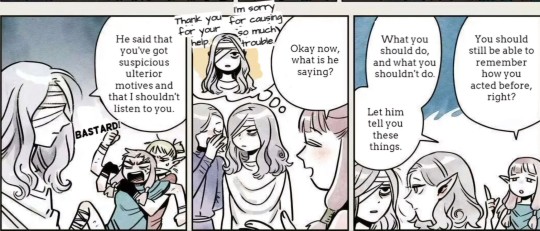
Mithrun basically accepts anything his caregivers do, but he's not grateful at all! I appreciate that in a disability portrayal. He'll also lie to and ignore his caregivers, which is Annoying but is definitely an expression of autonomy even if he's probably not doing it specifically to express his autonomy. He's not going to thank you. He's not going to make it easy. He'll accept a lot of things considered “undignified,” and he's not mean or unpleasant in the sense that he's taking advantage or anything, but he's certainly not a model patient.
He's running off back into the dungeons just when you think you've finally gotten him somewhere safe.
There's always a strange tension in caregiving, I've found. It is incredibly intimate but a lot of it is done by total strangers. A number of caregiving tasks are viewed by the wider world as entitled but placing those tasks in the hands of strangers is a remarkably tough place to be in. As a disabled person, I've had to accept my bowel movements being discussed with my parents’ friends, all sorts of being physically moved places not against my will but without my permission, even my pubic hair being shaved off by a stranger (nurse) while I was unable to speak or move. When people are feeding you, making sure you use the toilet, rubbing your feet to make you sleep, helping you with hygiene – people are working so hard to help you. Are you supposed to just accept them doing whatever they want to you?
There's also a dynamic where people will say they don't mind caring for you, they're happy to do it, and then as the years go by and you continue to need care the resentment just builds up. Caregiving is hard work. It's often thankless. The goodness of people’s hearts can run dry, when it's been twenty years and you still can't bathe yourself.
Aaand I need to continue in reblogs, because I'm out of space for images. Please hold. edit: you can find part 2 here
#eat or be eaten#I'm real and I beat myself up behind the Blockbusters#tbh i tried not to talk about myself too much here. but uhhhh caregiving issues are so tender for me#tender in the ouch way not the gentle way#anyway#dungeon meshi spoilers#dungeon meshi#mithrun
406 notes
·
View notes
Text
Haruka isn’t autistic-coded – he has an intellectual disability (and why that matters)
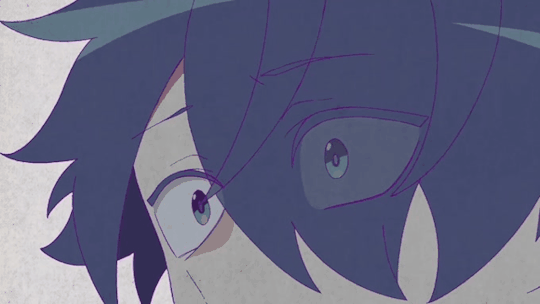
(AO3 Mirror)
A lot of people in the MILGRAM fandom (especially English-speaking MILGRAM fandom) state that Haruka is autistic-coded, as if it’s fact. Most recognize that Haruka is coded as disabled. (If you didn’t recognize that, I hope this post will help to explain why.) However, to state that he is coded as autistic specifically is incorrect. Haruka is coded as intellectually disabled.
Now, there are likely two things that contribute to this issue. One is the invisibility of intellectual disability as a whole, and another is the fact that a lot of this has to do with things that only someone who speaks Japanese would understand (such as complex vs non-complex words in Japanese).
In this post, I plan to lay out what an intellectual disability is and how it differs from neurodivergencies such as autism or ADHD. After that, I want to discuss the way Haruka speaks and uses words, the symbolism in his MVs, and how this lends to him being coded as intellectually disabled. Finally, I want to discuss why this even matters at all. Because, in truth, viewing Haruka as autistic instead of intellectually disabled leaves the viewer misunderstanding his story in a huge way that seems far too common in English-speaking MILGRAM fandom. So, I hope you listen to what I have to say.
What does it mean to be intellectually disabled?
Confusing autism and intellectual disability (henceforth referred to as ID) is not an issue unique to the MILGRAM fandom. They are quite commonly mistaken for each other, in the same way that autism and ADHD are both commonly mistaken for each other. And for the same reason, too – autism and ID are comorbid. This means that, if someone is autistic, they are more likely to have an ID. For this reason, it makes perfect sense to headcanon Haruka as autistic. I headcanon him as autistic, myself, actually. But, in this post, I’m going to be strictly talking about his coding, not headcanons, and he is very specifically coded with an ID.
So, what’s the difference? In the words of the National Institutes of Health, “Whereas ID is associated with general deficits across developmental domains, ASD is in fact defined by the observation that social communication deficits are particularly impairing.” (Source)
To say this in layman’s terms, autism is primarily characterized by difficulties in social communications. Cognitive abilities in autistic individuals vary, just like with allistic individuals, but the defining features are issues with social interaction and nonverbal communication. Autism by itself effects how effectively one communicates, but not intelligence. On the other hand, ID is a limitation on intellectual functioning, just like the name implies. This causes issues in areas like learning, problem-solving, and abstract reasoning.
A lot of people think ID is a synonym for ‘learning disability’. ‘Learning disability’ is an umbrella term that covers things such as dyslexia and dysgraphia. This isn’t the case. For one thing, ID can be a diagnosis on its own. ID is subdivided into syndromic ID, where intellectual deficits are present with other signs and symptoms, and nonsyndromic ID, where ID is, itself, the diagnosis. Examples of syndromic IDs include fragile X syndrome, and Down syndrome. For another, those with learning disabilities tend to have average to above-average intellectual abilities. Their disorder affects their ability to acquire and process information, but they are still able to learn. In contrast, ID affects the ability to learn at all, as well as affecting development and general function.
ID is a debilitating disorder. Many people with an ID cannot live independently, require help with self-care activities, and have limited communicative abilities. Understanding this – particularly, how ID is often a disability that requires a caregiver – is a key point to understanding Haruka as a character. But that’s to be covered later.
Words
The reason why this is a problem in the English fandom specifically is because the main thing tipping off the viewer to Haruka’s ID is the way that he speaks.
‘Weakness’, Haruka’s first-trial song, is written entirely in INCREDIBLY basic, elementary-level kanji – mostly hiragana and katakana. In fact, his first-trial song is misspelled in a lot of official releases of the song (‘Weekness’), which is a good way to get the same effect across. This is not the case across all platforms, though, for whatever reason. He also writes, in his trial 1 interrogation, with only that elementary-level kanji; often only one-word answers. The only complicated characters he knows are usually ones that mean something along the lines of, “I’m a stupid, idiot child,” which can be assumed to be because that’s what he has heard his whole life.
While I’m unsure if it is ENTIRELY in this basic kanji, his second trial song and interrogation is at least mostly written like this, as well. At this point, Muu is teaching him how to read and write (or, that’s what’s implied), but, even with that one-on-one attention, he is still speaking like a child most of the time to the Japanese ear.
When he’s forced to use or listen to words outside of this elementary-level kanji, he gets audibly confused, as well. In the AVIOT earbud collab, he has the voiceline, “Pairing seems to be in progress,” but, if you listen, he says “pairing” like it’s a question. (“Pair-ing?”) He doesn’t know the word is an English loanword that isn’t often used in everyday conversation, so he’s struggling to say it.
He also struggles when speaking to Es in his interrogations. He tries to say, “I will acknowledge any falsehood or silence,” but the words used are very advanced in Japanese. As such, he struggles with it, repeating, “False-hood? Si-lence?” Multiple similar exchanges happen in his interrogations, with Haruka misunderstanding words Es uses, and stuttering over unfamiliar words. The implication is that Haruka struggles with higher vocabulary or unfamiliar words, and with speaking and communication in general. He apologizes multiple times to Es for struggling, saying that he is not intelligent as an explanation multiple times. Additionally, in his second trial investigation, he talks about how he could never do the same things as everyone around him. When Es calls him stupid, he agrees. Es even states, “You really have no learning ability whatsoever.” When, mind you, having delayed or slowed learning is, like, the symptom of intellectual disability. It’s quite blatant. (Why is this not fandom consensus yet, again?)
Moving on from the point of how Haruka uses words, we can talk about other forms of word-based MILGRAM media. For example: when introducing himself, he says he thinks he’s 17, which implies that he isn’t actually sure. Additionally, there is lots of evidence for his intellectual disability in his interrogation questions:
He considers it impossible to learn another language
His dream is to ‘live normally’
He states he disappointed his father (not inherently an ID-related thing, but also, makes sense with his coding in mind)
Many answers imply that he’s been unable to live his own life, and he doesn’t really have any aspirations outside of being given attention
Finally, we have the lyrics to his songs. Again, on top of being written in very basic kanji, we have lines like the following, which include repeated themes of needing a caregiver (being ‘hopeless’ by himself), not being able to do what others can do, hating how he was born, and struggling to function. (I have bolded examples that I think are especially apt.)
“Why was I born like this? Why does it hurt so much?” / “Why was I born to be me? Why does it hurt so much?”
“Instead you kept calling me “hopeless” / You never called me by my name / You were always comparing me to someone else”
“If I tried and couldn’t say it, you would get angry at me and say “You’re hopeless”” / “When I tried to understand it, you’ll make that disappointed face again”
“I just wanted to be your good boy” (what did the MILGRAM team want us to think when they included this line? likely that he’s childish or ‘hasn’t grown up’, right?)
“Mommy, look / I’ve done great” (calling her ‘mommy’ instead of ‘mom’ – again, ask what the MILGRAM team wants us to think when they included this)
“If only I could do what anyone else could do”
“It’s enough, I am a “disappointment””
“My life started in a wrong spot”
With regards to his relationship with Muu, he doesn’t understand why Muu using him would be a bad thing, or how she is manipulating him. People with ID tend to have poor judgment, and Haruka not being able to tell the difference and not caring about the difference between negative and positive attention shows this (although his trauma definitely also plays a role).
Finally, we have the trial song titles.
We’ve already discussed how “Weakness” is sometimes alternatively misspelled as “Weekness”, and that is because the title in Japanese is, arguably, misspelled, too. The Japanese title is a play on the phrase jakuniku kyoushoku, which is equivalent to the English phrase, “Survival of the fittest.” More directly, it translates to, “The weak are meat, the strong do eat.” The character for “strong” (kyou) is replaced by “together” (also kyou) – with the implication being that Haruka forgot which version of the word was correct for this situation. This also works to create a pun, of sorts, as this makes the title more like, “The weak are meat, communal eating”, creating an emphasis on the fact that there are more people eating than there are ‘weak people’. There are differing ways to interpret this pun, but one way is to view it as a statement on Haruka’s status as a minority, oppressed (‘eaten’) by the majority.
On the other hand, we have All-Knowing and All-Agony. In Japanese, this song title is Zenchi Zennou, which can be translated as “Omniscient and Omnipotent”, used to describe the Christian God. Once again, we have what we can assume is Haruka misspelling the title, creating a pun. One that is much more on the nose, as the character for “ability” (nou) is replaced with the character for “worry, distress, pain” (also nou).
It seems that the reason why Haruka uses new complicated words (aside from the words meaning “idiot” and the like) in All-Knowing and All-Agony is because Muu is teaching him. It features the more complicated “食” (shoku; food), when we know from Haruka’s 2023 birthday portal that Muu is bringing him meals. It also prominently features Muu’s name, 夢 (yume; dream), which is more complicated, as well.
Imagery
Now, we get on to the non-verbal, more visually-based evidence for Haruka’s ID. Be prepared for a lot more images!
Going back to Muu teaching Haruka how to write: it’s not just clear in his usage of kanji, but also how he writes. Comparing his handwriting, it becomes much easier to read after Trial 2’s start, and his writing is soft and bubbly; much like a teen girl’s writing might be.
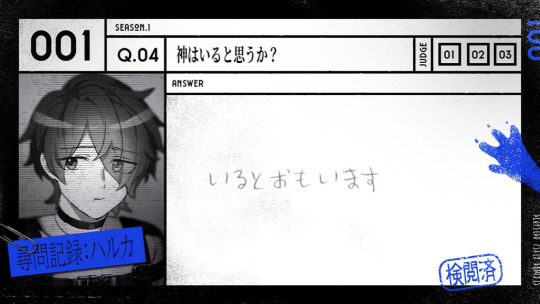

All of these improvements are able to be linked back to Muu (both his style of writing and in the more complicated words that he knows), who we know is looking after him. Considering this, it’s pretty clear why he sees her like a maternal figure.
One of the Minigram comics shows the prisoners eating curry udon together. Of the four shown (Amane, Haruka, Shidou and Mahiru), Amane and Haruka are the only two who make messes out of their clothes. Since the other two characters in the comic have active roles, and Haruka has the most passive one, Haruka’s inclusion can be assumed to be because he is the only prisoner aside from the child, Amane, who would make a mess while eating.

Childish themes and imagery are seen scattered throughout his MV, as well, especially his first one. He draws with the skill level of a child, which is a very prevalent motif, and he is shown to sleep with a plushie.
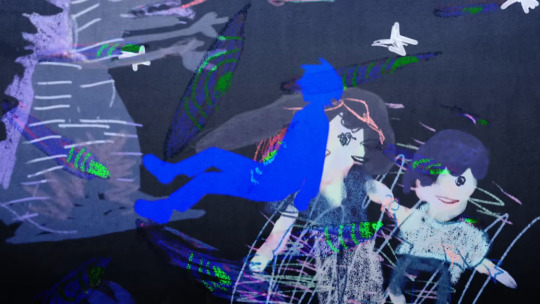
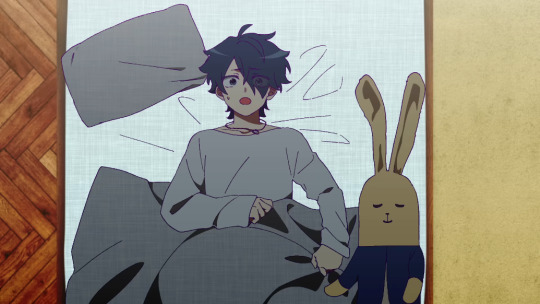
Additionally, he seems to have trouble putting on his clothes. He wears two entirely different socks – not just different colors, but also two different lengths. His pant legs are also two different lengths when he tries to roll them up in his Trial 2 art, and he seems to exclusively wear slip-on shoes up until he befriends Muu (where we can presume that she begins helping him, and even then, they're not done properly).
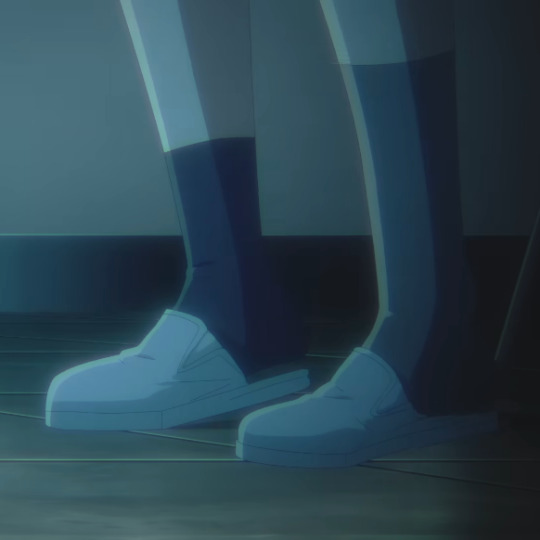

There are various visual parallels drawn between himself as a child and himself as he is now (for example, the way that his clothes are a mix of his current shirt and the vest he wore as a child in All-Knowing and All-Agony), and he often compares himself to a child wanting praise.

Even the violent acts that Haruka is shown committing are also a sign of an ID. People with IDs tend to have meltdowns, and devolve into fits of violence. The reasons for these meltdowns vary depending on the person, but reasons can include anger / frustration (especially in reaction to not being able to communicate well), sensory overload, and confusion.
You may note that Haruka’s mother reacts the exact wrong way for dealing with these meltdowns. When trying to help someone experiencing a meltdown, especially a violent meltdown, the last thing you want to do is appear frightened. The number one piece of advice everyone gives for helping someone experiencing a meltdown is to remain calm. It’s also not advised to leave the person alone, either, because that sends the message, “I want to avoid you when you feel this way.” (Which I suppose, for a neglectful mother like Haruka’s, would be technically accurate, but still not at all helpful.)
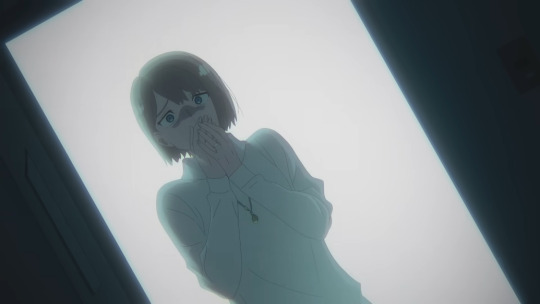
It only makes sense that Haruka’s tantrums continue to get worse and worse.
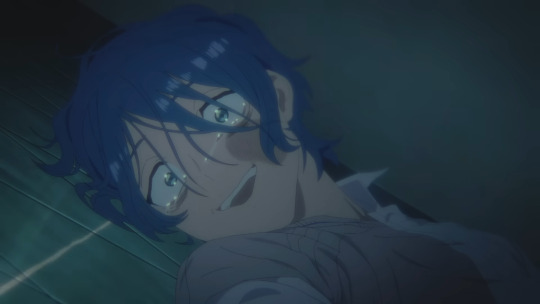
But after the meltdowns fade, he seems to not understand what he’s done. He’s shown experiencing fear and confusion after he hurts something, even shown as his child self at one point. A major part of IDs is being unable to connect actions to consequences.
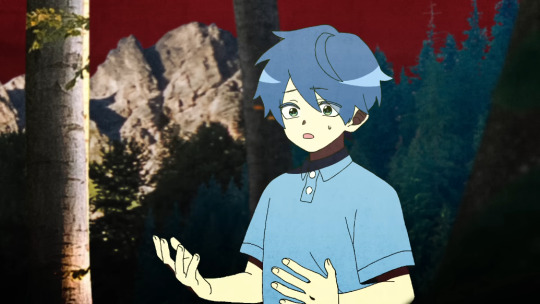


Finally, we go onto his body language. Frankly, I considered putting, “Imagine this as a real person doing these things and not an anime boy, and you’ll see my point.” Which is true. But I decided to go a little more in depth.
Swaying is heavily associated with people with IDs. This is, in part, because people with IDs have reduced postural balance, and general body balance. Because of that lack of postural balance, people with IDs tend to slump quite heavily, as well. Both of these traits are shown very obviously with Haruka, in All-Knowing and All-Agony.

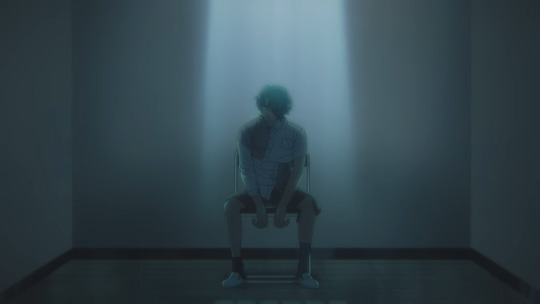
In the same MV, he’s also shown biting his nails. Like autistic people, people with IDs stim, and this could also be a version of hand mouthing (repetitive contact between the hands and the mouth / tongue), which is also heavily associated with / often seen in intellectually disabled people. He's also shown doing this in promo art.
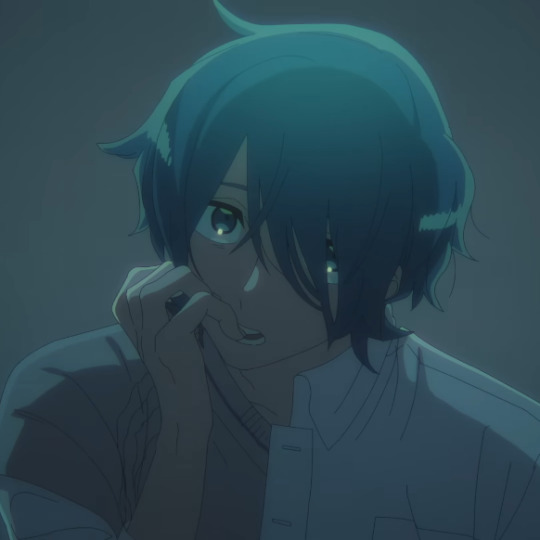
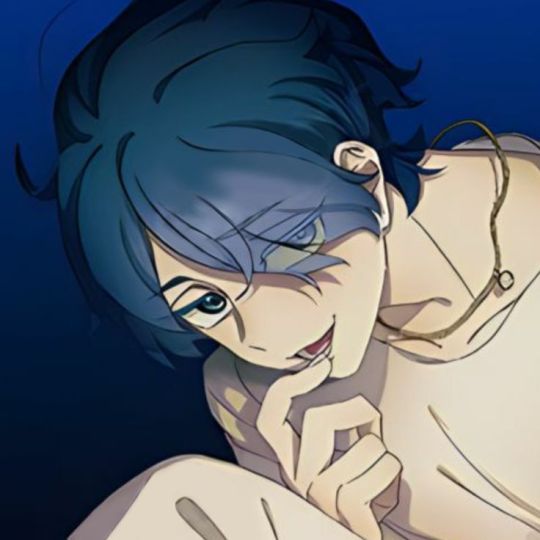
So, why does this matter?
Haruka being intellectually disabled is a huge part of his story, and, when taking it into consideration, it changes how one views his story a lot.
Haruka being treated better as a child makes more sense with this framework. He wants to return to when he was a child because his level of intellect then was seen as more ‘normal’. There wasn’t as much obviously ‘wrong’ with him yet. Children are expected to be a little slow, but it’s when they remain that way that many parents begin to become concerned. He yearns for when his mother didn’t know he was disabled, and when she treated him better for that reason.
Haruka being severely neglected / abused by his mother would be awful, no matter what, but him being intellectually disabled makes it so much worse. He needs attention and care from his caregivers even more so than the average child does, because he has trouble even functioning on the day-to-day without help. This is why he thrives under Muu’s care; she is meeting his support needs. Likely not perfectly (she’s just a teenage girl, and she is almost certainly not trained or educated in this regard), but even with the amount of support that she is able to give, Haruka is thriving. He’s more confident, he’s learning how to write, and he’s eating more consistently.
Without that care, he struggles so severely that he melts down regularly, going into fits of violence over the fact that his support needs aren’t being met (on top of all of the other emotional baggage that comes with any child being neglected by their parent). Haruka’s mother continued to ignore these cries for attention, for help, for care… Until it went too far.
The way that Haruka’s story is viewed changes drastically with this information. If Haruka was autistic, it would affect very few of the things that I listed. So much of Haruka's story hinges on specifically his intelligence level, not how he socializes. And do you have any idea how many people I’ve seen say, “He’s a neurodivergent with a shitty mom, but so am I, and I didn’t kill anyone about it”? No. If you are not intellectually disabled, you do not get to compare your experiences as if they are equal. If you don’t have an ID, your experiences cannot be compared in this way.
Haruka has a debilitating disability that requires support which he was not getting. He was experiencing ableist abuse at the hands of his mother, and he didn’t know how to handle it. All of his violence happened during his meltdowns, and his disability makes it harder for him to connect his actions to the consequences, or find alternate ways to solve his problems – this is all extremely important information and context when you’re discussing whether or not his crime is forgivable.
If you still don’t forgive him, that’s alright. But to neglect this aspect of his character is, to be frank, baffling, if you’re trying to participate in the spirit of the series and understand everyone’s crime to the fullest extent. And to make jokes, comparing your own experiences to Haruka’s, since you assume him to be neurodivergent and nothing else, does a huge disservice to his story! And, when it’s done to demean him? It honestly comes off a slight bit ableist.
So, I’d like everyone to keep this information in mind moving forward. Don’t infantilize Haruka for his disability. But do consider this information in your analysis posts, your discussions, and so on. I’d like to see this become common knowledge in the MILGRAM fandom, especially since the idea of him being specifically autistic-coded is so widespread by this point.
Thank you!

#haruka sakurai#milgram#the milgram project#milgram meta#milgram analysis#intellectual disability#haruka#sakurai haruka#azure does a thing
573 notes
·
View notes
Note
oooph the eds diagnosis issues. i have freaky flexible hands, ive had every type of tendonitis u can think of, i rolled my ankles so often in highschool xc it was a running joke, my knees bend 4 different ways instead of 1, and i can do terrible things to my rotater cuffs while asleep on a good mattress. people say ohhh have u heard of eds because that's what that sounds like. and then i go to rheumatologists and they call me a liar. blegh i hate my amorphous unidentified chronic problem.
I’ve told this story before and this is by no means indicative of all rheumatologists—there are some absolutely astounding ones who’d move heaven and earth for their patients. But we had a family member a few years back who was a renowned specialist in his field. Brain surgeon. Highly sought after.
Anyway. He had a heart attack that left him dead for quite a bit before they managed to revive him. Several weeks later, when he was able to talk again, he asked his wife how long he’d been dead and she told him. And he knew this meant he’d be left with severe cognitive and physical impairments. Bad enough that he’d never be able to perform surgery again. After a pause he reportedly sighed and said, “Well, at least I can still be a rheumatologist.”
In all seriousness, the reason rheumatologists are so bad with things like Ehlers Danlos Syndrome is because EDS isn’t a rheumatoid affliction.
We just get thrown to them as a last resort because geneticists are in such short supply and no one else knows what the hell to do with us. So it's really not their fault, but at the same time their lack of knowledge is doing serious harm to people with EDS and those seeking a diagnosis.
I mean, hell. The last one I saw told me I wasn’t tall enough to have EDS and keeps challenging my diagnosis because “ehlers danlos doesn’t cause pain”. Like Wtf?
402 notes
·
View notes
Text
Reverse: 1999 : Disabled Characters
The game doesn't stray too far on the neurodivergent allegory for the arcanists themselves. But at the same time, there are also inclusions of other characters who are very much known to be disabled. So for this post I'll delve into that, just a bit.
Now, there are 10 characters that I want to put in the spotlight. These mostly lean towards being canon, but a part of these are also researched upon and shortened so the post doesn’t become way too long.
Cristallo, Rabies, Erick : Chronic Illness
It's quite self explanatory that Cristallo herself has a chronic illness. She was born prematurely, with an added condition that makes her physically fragile. As seen in the game, she needs a life-support system to maintain her health when she's outside. It's also implied that her condition may be a recurrent cancer, as her arcane abilities are tied to a machine that provides cobalt therapy, a known advancement in radiotherapy in the post-WWII era.
Rabies is an odd case. In his stories, it's noted that Adam cured Alicia through unknown means at the cost of contracting rabies himself. However, instead of the virus being acute and guaranteed to be fatal, it becomes a chronic illness to Rabies due to the abundance and use of arcanum. And since the rabies virus attacks the brain, his cognitive capabilities and ability to recall things before the present had been impaired, making him rather docile and animal-like in nature as a result.
Erick, as revealed in her anecdote, has a hereditary blood condition that came with her arcane skill. With her arcane skill making her physically powerful, overusing it will accelerate the effects of her blood condition to the point that it can become fatal. To prevent this, she also inherited an armband from her grandfather, Harald. The armband suppresses one's ability to use arcane skills, but by extension it also prevents Erick's condition getting worse.
Shamane : Amputee
Shamane's circumstances are also self-explanatory. He lost his arm for unknown reasons, but after having lived without it for 20 years, it doesn't bother him anymore. However as we know, he crafted his prosthetic arm as a means to avoid scaring kids. (which I think is quite cool in itself)
Ms. Radio, Bessmert : Blindness
Ms. Radio and our new friend, Bessmert, are both canonically blind. Ms. Radio has stated that she cannot see, and asks Vertin to left in places where she can feel temperatures to make her feel at peace.
And as we know, Yenisei (or in other words, Yenisei's VA) has stated in the 1.6 livestream that Bessmert is known to be blind, but even with that, she's a great researcher and guide to her.
Mesmer Jr. : OCD [Content Warning: Mentions of Self Harm and Suicide.]
Mesmer Jr.'s character has heavily implied throughout the main story and her own to have OCD as a result of the traumatic experiences she had gone through from her field of work and her family’s history in it. She identifies that she has "incurable" anxiety, which causes her to think differently about arcanists and act a little irrationally from our own perspective. This anxiety results in double checking everything and having a slightly intensive routine.
This routine is created as a means to maintain herself and her own sanity, but an imbalance or interruption can greatly upset her. As a result, she has conflicting ideals, experiences hallucinations and panic attacks, has suicidal thoughts, and actively inflicts self harm as a means to cope with her anxiety. However, she’s calmer and at peace with herself when she's left alone in a quieter and clean space, away from others, and where nature is heard more than constant buzzing. In short, Mesmer Jr.’s mental health is really complex and would be better if it's explored in a separate post.
Baby Blue : Alice in Wonderland syndrome
It's no secret that Baby Blue has Alice in Wonderland syndrome, or in other words dysmetropsia. This affects her perception of reality and her ability to recall, but this in turn makes her arcane abilities all the more powerful. As a result, she doesn't realize that she's growing up, yet it seems she doesn't mind that much. This doesn't seem to affect her physically either; In fact, it has a heavy influence on how she displays her arcane skills.
Poltergeist : Social Anxiety
Poltergeist has been known to be anxious in social settings which conflicts with her people-pleasing tendencies. She's also insecure about herself which adds up to her not wanting to be directly perceived. At the same time, she doesn't like being left alone as a result of having been ignored and forgotten post mortem. Poltergeist is also elaborate (i.e. not wanting to be looked at for too long) yet awkward at the same time when communicating them.
However, I'm not sure how to describe Poltergeist's case quite well, but the idea of her having social anxiety resonates greatly in my mind, so it can be treated as a partial headcanon.
Balloon Party : Autism and Speech Impairment
Balloon Party as a child had contracted an illness that caused her to have a persistent high fever. In the end, she awakened her arcane skill this way, with her being able to cough up balloons that can be harmful or a cure to anything.
However, it might have also affected her speech because of the physical strain that comes from coughing, it results to BP's speech being a bit slow and having abnormal pauses before she speaks again. Though, this also might be a sign of her possibly also having autism, where rigid and uneven language development is a common pattern in how autism affects one's ability in communication. Her speech also has a pattern of echolalia, having a flat tone, and lack of control of it.
However, speech impediment isn't everything about autism, and there's a lot more about BP's character that also connects with it such as her special interests. I can better explore this in a different post, which will be explained below.
Last Notes
These are the characters I’ve written down, most of these are less headcanon and more of observations I’ve found when looking into these characters. Some people from the lore chat have also added their own insights on some of them. (Thank you lupjo for beta-reading through it and helping me out)
Of course, there are a few more characters I want to discuss because of the implications of them having autism / ADHD, but these will be written in another post in the future because I still need to research and gather other information. Additionally, it would be an opportunity to talk about the connections between an arcanist’s and neurodivergent person’s relationships with modern society.
Congrats for reaching the bottom of this post, and feel free to add your own ideas or headcanons about the characters here and/or any other ones.
#reverse 1999#cristallo reverse 1999#erick reverse 1999#rabies reverse 1999#shamane#mesmer jr#baby blue reverse 1999#poltergeist reverse 1999#balloon party reverse 1999#i still have difficulty explaining these things#time to disappear for months again
310 notes
·
View notes
Note
It’s all fun and games until one of the kids actually gets sick (just a cold or the flu, nothing too crazy) and the bots have to learn about the joys of human illnesses
Hazmat suit time.
Illness on Cybertron generally tends to be pretty quiet. Its often software issues or does not present itself outwardly unless its serious. Their version of a common cold is a software issue that can cause a mech to overheat if they aren't paying attention. Things such as the flu would present as cognitive impairment or an inability to transform. In short, a good number of Cybertron's ailments do not appear on the frame unless one is really looking.
The only illnesses that appear in such a drastic manner are the lethal ones.
As such, when the kids came in with colds, or in Jack's case, the flu- well, the team did not handle it well. They couldn't be sure it wasn't able to transfer across species, and not to mention, their contaminated fluids could damage other humans or equipment. Seeing the children's state quickly got Ratchet to pull out his emergency quarantine equipment.
Ratchet, Arcee, and Bumblebee got themselves dressed helm to pede in hazmat suites, fitted with masks and everything. The bigger mechs in the room where fitted with tarps held in place with rope. Their faces were covered similarly, leaving only their optics visible. Terrifying? Perhaps. But required? Absolute according to Ratchet.
The children were examined as much as possible and Ratchet promptly separated the three from one another. Miko was put into her own pen filled with blankets, food, and water. Bulkhead was set to watch her and let Ratchet know if her temperature shifted too much. Rafael and Jack were treated the same and put in separate units with their guardians watching over them. Optimus served as a constant watchdog and went from unit to unit to assess the children personally and reassure them. Ratchet meanwhile kept constant tabs on their states as he frantically tried to call June and Fowler.
The children did try to tell the team that they were fine, but at most they got pitying looks and assurances that they were going to be fine. The team genuinely feared the kids could die, but none said a word as they worked in silence. When June and Fowler arrived, both were given gas masks and gloves. Only then were they carefully allowed to see the children from a distance. The team weren't taking chances.
Only after Ratchet explained the symptoms did June go from worried to amused. The whole team got to stand around feeling dumb as June told them that the kids were going to be fine. They just needed to go home and rest. All that effort and looking like penguins had been for nothing. Ratchet will die on the hill that he was right to react so drastically. The team disagree and occasionally mock him for it.
#transformers#maccadam#transformers prime#team prime#optimus prime#bumblebee#ratchet#bulkhead#arcee#tfp kids#miko nakadai#rafael esquivel#jack darby#cybertronian biology
247 notes
·
View notes
Text
GUT HEALTH: How it Affects Your body 🍽️🤍✨
Having a healthy gut is important because it plays a central role in the overall functioning of your body. The state of a healthy or unhealthy gut affects all of these things:
Digestion and Nutrient Absorption: The gut's main role is to break down food and absorb important nutrients, including vitamins and minerals. When the gut is healthy, it digests food effectively and maximizes nutrient absorption. When it is not, it can result in digestive issues such as bloating, gas, and diarrhea, as well as nutrient deficiencies.
Immune System Support: About 70% of our immune cells are located in the gut. A balanced gut supports a strong immune response, helping the body fend off illnesses and reduce the risk of infections.
Emotions and Mood: The gut and brain are intricately connected through the gut-brain axis. The gut produces many neurotransmitters, including serotonin, which regulates your mood. An imbalanced gut can influence mental health, leading to issues like anxiety, depression, and even cognitive impairments.
Hormonal Balance: The gut plays a role in the production and modulation of certain hormones. This can impact various bodily functions, from stress responses to reproductive health.
Weight Management: The gut microbiome can influence metabolism, appetite, and fat storage. An imbalanced gut can lead to weight gain and metabolic disorders.
Protection Against Chronic Diseases: Poor gut health has been linked to a higher risk of chronic diseases, including type 2 diabetes, cardiovascular disease, and certain types of cancer.
Detoxification: The gut plays a role in eliminating waste products and toxins from the body.
Inflammation Regulation: A healthy gut can help regulate inflammation in the body. Chronic inflammation, often resulting from an imbalanced gut is a root cause of many diseases.
Skin Health: There's a connection between gut health and skin conditions. Issues like acne, eczema, and rosacea can be influenced by the state of the gut. An unhealthy gut can lead to inflammation, which may manifest as skin issues.
Barrier Function: The gut lining acts as a barrier, preventing harmful substances from entering the bloodstream. A compromised gut lining, often referred to as "leaky gut," can allow toxins and pathogens to enter the bloodstream leading to various health issues.
Production of Vital Compounds: Your gut produces essential compounds, like short-chain fatty acids, which has a lot of positive effects on health from reducing inflammation to supporting brain function.
Sleep Function: The gut produces neurotransmitters and hormones that regulate sleep, such as serotonin and melatonin. An unhealthy gut can disrupt sleep patterns.
#gut health#health and wellness#healthy living#mental health#healthy diet#health#wellness#healthy lifestyle#health tips#health is wealth#food#nutrition#level up journey#self help#self care#personal improvement#personal development#personal growth#skincaretips#skincare
755 notes
·
View notes
Quote
Donald Trump bungled his criticisms of rival Joe Biden in a speech Friday at the Pray Vote Stand summit in which he said the current president is “cognitively impaired” and will lead the world into a second world war. “Just think of it,” Trump said. “We would be in World War II very quickly if we’re going to be relying on this man.” This is unlikely; World War Two ended 78 years ago. Trump also seemed to suggest that he is leading former President Barack Obama in polls of the 2024 race, despite Obama not being in the contest. “As you know, crooked Joe Biden and the radical left thugs have weaponized law enforcement to arrest their leading political opponent, and leading by a lot, including Obama—I’ll tell you what,” Trump said.
Trump: ‘Cognitively Impaired’ Biden May Cause ‘World War II’
499 notes
·
View notes
Text
I remember studying Flowers for Algernon at school, and what a huge impact it had on me. How dreadful, I thought, to know your intelligence is slipping away and being unable to prevent it. The horror you must feel.
And now, as I sit here with my multiple chronic illnesses that cause various types of cognitive impairment, watching my ability to think, plan, create, follow instructions, find the write words and form complete sentences slip away like grains of sand through my fingers, I know what that horror feels like.
So I looked up Flowers for Algernon, to see if I could find any quotes, find out if I was misremembering it, inflating it in my mind into something grander than it was.
I was not.
The quotes are still emotionally devastating.
"I'm not going to give up my intelligence without a struggle. I can't go back down into that cave. There's no place for me to go now"
“It was as if I had been looking at the whole thing clearly on the blackboard of my mind, but when I turned to read it, part of it had been erased and the rest didn’t make sense.”
"The only question now is: How much can I hang on to?."
"But writing is harder. I have to look up even simple words in the dictionary now and it makes me angry with myself.”
Excuse me while I weep for a while for what I've lost.
#flowers for algernon#chronic illness#chronically ill#chronic migraines#chronic fatigue#chronic pain#hEDS#PoTS#postural orthostatic tachycardia syndrome#dysautonomia#hypermobile eds
716 notes
·
View notes